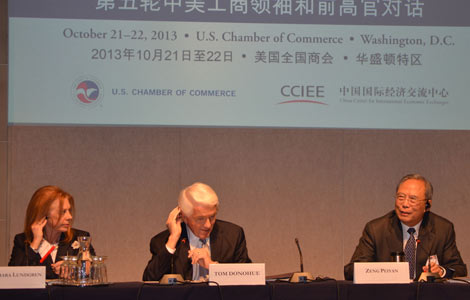US firms urge easier process for investment
Updated: 2013-10-25 00:08
By HE WEI in Shanghai (China Daily)
|
||||||||
The United States business community in China is calling for a streamlined investment approval process, the opening of more sectors to foreign participation and prioritization of the US-China Bilateral Investment Treaty.
In the latest issue of its Policy Spotlight Series, the American Chamber of Commerce in China identified common investment hurdles facing its members, and it made recommendations across 12 sectors to address such issues.
"Although foreign companies remain eager to invest in the Chinese market, challenges such as discriminatory industrial policies, opaque investment approval procedures and a lack of effective administrative and legal recourse when investments are denied pose huge barriers to potential benefactors of the Chinese economy," said Greg Gilligan, chairman of AmCham China.
China should, as a first step, streamline the foreign investment approval process.
China uses what it calls the Guiding Catalogue on Foreign Investment in Industry as the regulatory framework to classify sectors into "encouraged", "restricted" and "prohibited" categories.
The AmCham report said the last revision of the catalog in 2011, while liberalizing investment in several sectors, imposed new limits on others including agriculture and domestic express letter delivery services. It said this move was "at odds" with China’s own objectives as outlined in the 12th Five-Year Plan (2011-15).
The report suggested that the next revision of the catalogue shouldn’t increase the restrictions on foreign investment in any sector but should instead reduce the number of sectors that are restricted, prohibited or require joint ventures.
The chamber also called for simpler documentation requirements, as well as the removal of the requirement that each wholly foreign-owned enterprise must provide a unique company address prior to issuance of its business license.
It also urged that further steps be taken to implement more fully World Trade Organization and bilateral commitments to not condition investment approval upon research and development, technology transfer or other requirements.
Further, the organization expressed strong support for the ongoing US-China BIT talks. The 10th round of the talks are being conducted this week in Washington.
The BIT mechanism presents "an excellent opportunity for both [parties] to discuss mutually beneficial reforms of their respective inbound [foreign direct investment] approval processes, and ways to further apply the principles of national treatment and reciprocity", it said.
"We hope the final agreement makes minimal exceptions to national treatment and allows private and State-owned as well as foreign and domestic companies to compete on a level playing field."
China has witnessed declining new inbound FDI projects, which — though holding up reasonably well in the global context — fell by 3.7 percent in aggregate value year-on-year in 2012, according to data from the Ministry of Commerce.
Although data from the first half of 2013 show a 7.1-percent increase in utilized foreign investment, the number of newly approved foreign-invested enterprises was down 7.7 percent year-on-year, indicating slowing investments by global multinational companies.
AmCham examined 13 industries, from agriculture and online payments to commercial banking and clean technology, and made corresponding recommendations for further opening up.
These include the agriculture sector, for which it suggested permission for greater foreign investment in the seed sector, particularly in distribution and retailing.
In the aviation sector, it suggests the adoption of more flexible investment requirements and tax treatment for foreign company participation in China’s civil aircraft programs.

 Giant duck to exit after drawing the crowds
Giant duck to exit after drawing the crowds
 Miss Universe 2013 to be held in Moscow
Miss Universe 2013 to be held in Moscow
 Ministry to begin inspecting most heavily polluted regions
Ministry to begin inspecting most heavily polluted regions
 Spy claims stir rebuke to Obama
Spy claims stir rebuke to Obama
 Paint the world a picture
Paint the world a picture
 World's first 1-liter car debuts in Beijing
World's first 1-liter car debuts in Beijing
 Latin American clown convention
Latin American clown convention
 Prince George baptized in London
Prince George baptized in London
Most Viewed
Editor's Picks

|

|

|

|

|

|
Today's Top News
US will stage foreign investment summit
Chinatown restaurants learn how to get an 'A'
Snuff bottle 'gems' on display at Met
Beijing airport set to become world's busiest
US firms urge easier process for investment
China calls for strengthened EU ties
Spy claims stir rebuke to Obama
Traders in Yiwu cashing in on e-commerce shops
US Weekly

|

|







